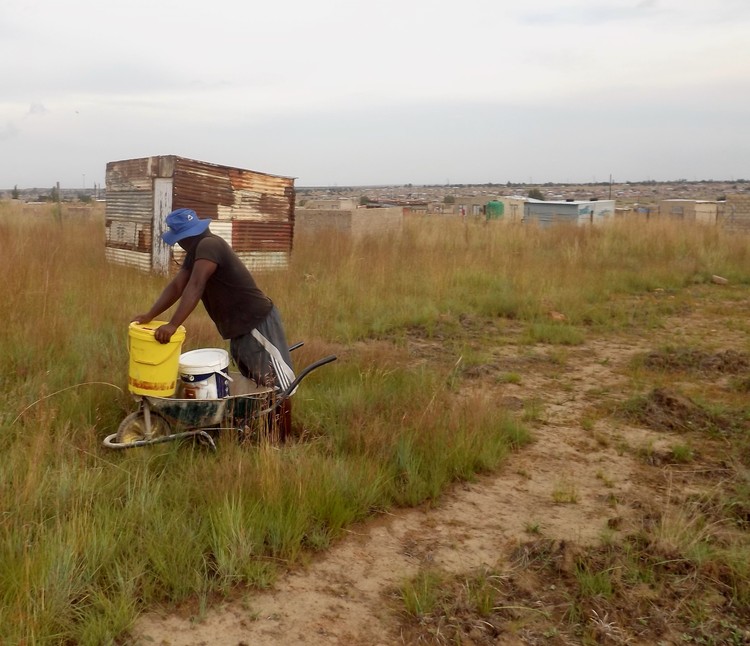Mpumalanga villagers trek 3km for drinking water
People in Tweefontein Extension N say piped water has been promised since 2017
Sello Madiba takes a break from pushing his wheelbarrow with drinking water which he collected three kilometres from home in Tweefontein, Mpumalanga. Photos: Warren Mabona.
Hundreds of households in Tweefontein, Mpumalanga, have to fetch drinking water from a car wash about three kilometres away.
On a daily basis, residents of Tweefontein’s Extension N can be seen pushing wheelbarrows loaded with water containers along rocky roads overgrown with tufts of grass.
There are about 400 households – some are shacks, some are more formal dwellings – who are affected. They have been waiting for piped water since 2017.
A few households have managed informal connections, as neighbouring Thokoza village has a water supply. Most people, however, beg water from the car wash business located on the periphery of the township.
Sello Madiba bought a stand in 2019 from the local traditional leader, who, he says, was authorised by the municipality to sell plots. Madiba has now built himself a two-roomed house.
“Pushing a wheelbarrow for such a long distance almost every day just to fetch water is tiring and frustrating,” he says.
“The municipality has been promising to install pipes and supply water to our yards since 2017,” says Jan Skhosana, one of the first residents to move to Extension N.
Skhosana buys water from private water trucks to fill a tank he installed in his yard. He pays R250 a for 2,500 litres, which lasts him, his wife, and four children about a month.
Josinah Mohomane, who is unemployed and has three small children, can only afford to spend R50 and so she buys water from other residents who have made bulk purchases.
Thembisile Hani Local Municipality spokesperson Simphiwe Mokako said she was awaiting information regarding water provision to Extension N from the technical services department. Questions were first sent on 26 March but comment has still not been received.
However, Mokako confirmed the municipality has allowed traditional leaders to sell residential stands.
But ward councillor Fikile Mgayi (ANC) said water pipes could not yet be installed for Extension N as “that village has not yet been formalised”.
Mgayi said ten public water tanks were provided by the municipality some time ago, and the municipality regularly sends tankers to fill them.
GroundUp could find no trace of these water tanks, and residents said it was the first they had heard of these tanks, or of municipal water trucks.
“Some people have bought tanks for themselves and put them in their home yards,” said Madiba.
Getting water to drink is a daily struggle for residents of Extension N in Tweefontein, Mpumalanga.
Support independent journalism
Donate using Payfast

Don't miss out on the latest news
We respect your privacy, and promise we won't spam you.
© 2024 GroundUp. This article is licensed under a Creative Commons Attribution-NoDerivatives 4.0 International License.
You may republish this article, so long as you credit the authors and GroundUp, and do not change the text. Please include a link back to the original article.
We put an invisible pixel in the article so that we can count traffic to republishers. All analytics tools are solely on our servers. We do not give our logs to any third party. Logs are deleted after two weeks. We do not use any IP address identifying information except to count regional traffic. We are solely interested in counting hits, not tracking users. If you republish, please do not delete the invisible pixel.


